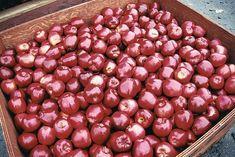
There will be a shortage of North American apples for the UK market for two to three weeks following the discovery of waxing agent morpholine on supplies of Chilean fruit by the Food Standards Agency.
The agent is viewed by the FSA as a food additive and not permitted in the EU, but is commonly used legitimately in the US, Canada, Chile and South Africa as a processing aid in emulsifiers.
UK importers are having to work urgently with their suppliers to ensure alternative waxes are used at source and shipments have been delayed as a result, hitting the industry hard financially.
One UK importer told freshinfo: “This is a difficulty in terms of our US fruit. We are having to look at waxes that are morpholine-free - there are three that are listed as permissible. There is a bit of difficulty as to which classification the wax comes under and many suppliers just list that emulsifier has been applied without specifying its constituents.”
The Fresh Produce Consortium is taking the FSA to task over its handling of the incident and has said it is “deeply concerned” the agency is raising undue consumer concern, slamming its response as “utterly disproportionate”.
“The FSA’s inference that it has acted diligently and promptly to protect consumer interests is ridiculous given that they were tipped off with regard to a potential issue back in May,” said chief executive Nigel Jenney. He added that the FPC was holding the agency responsible for any consequences, but stopped short of saying whether this included any financial losses.
The FSA itself stated that exposure to morpholine from the levels detected in apples is likely to be of low health risk based on its own initial risk assessment. And the FPC is challenging its interpretation that morpholine is a food additive and not a processing aid.
A spokeswoman from the FSA told freshinfo: “The EC regards the use of morpholine in wax for the surface treatment of fruits as an issue covered by additives legislation. The use of morpholine as a carrier in waxes used for the surface treatment of fruit is not permitted under EU legislation. Therefore fresh produce that has been treated with morpholine should not be on sale within Europe. The EC has made clear its view on this issue.”
Morpholine is also used on citrus outside the EU and following negotiations with the FPC, the FSA has accepted that citrus lines treated with morpholine can continue to be marketed in the UK.
Jenney said that UK retailers have been supportive of the industry and the British Retail Consortium has been in contact with the FSA on the issue. “The food additives regulations are highly complex and are going through a review process,” he added. “Morpholine is an ingredient in emulsifiers and many in the industry would have considered it to be a processing aid and not an additive so therefore outside the scope of the regulations.”
But the FSA spokeswoman disagreed: “The onus is on food business operators to make sure they are complying with the law.”
The FPC has taken its concerns to senior UK and EU officials.



